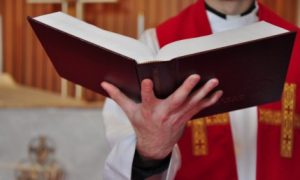The Grammar of Holiness: Part 1
Today the average person in the West is losing or has lost a sense for what is holy. While this certainly goes along with a decrease in worship attendance in all Western countries (North America, Europe, Australia, New Zealand) this situation is also affecting the Christian church. An increasing trend toward secularism and atheism in the West has brought with it a rejection of the ancient categories of what is holy and what is common.
About ten years ago, Dr. Kleinig, an Australian Lutheran professor of mine told the story of a Lutheran graduate student of his from Papau New Guinea (a place with a great awareness of holiness) who took a trip to the United States. He worshipped in one or more of our sister Lutheran Church-Missourri Synod churches and when he came back he had a conversation with Dr. Kleinig. Dr. Kleinig asked his graduate student how his trip went and the student seemed disturbed. Referring to Lutheran worship in North America the student responded to Dr. Kleinig, “For them nothing is holy anymore!”
This old conversation came back to my mind last week as a friend of the congregation mentioned something that happened at a worship service of her non-Lutheran church here in Kitchener-Waterloo. The pastor of her church said in response to the members of the church treating the Host with reverence in Holy Communion, “Get over it people! It’s just a cracker!” The Christian lady was deeply shocked at such talk from a pastor because she rightly saw the Host in Holy Communion as Christ’s Most Holy body given for the forgiveness of her sin.
This incident right here in a Christian church in K-W got me thinking that it is very important for Christians to regain a biblical knowledge of what is holy. Gaining this we will once again be able to regain the ability to make a proper distinction between what is holy and what is common. Having this we will understand worship in the Divine Service with greater clarity and it will also help us in our sharing of the Christian faith with those of other religions who have a sense of holiness and with those we know who have lost a sense of the holy.
Check back in the near future for a blog post series on the grammar of holiness.
In Christ,
Pastor Korsch

